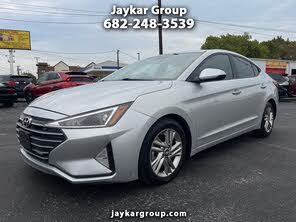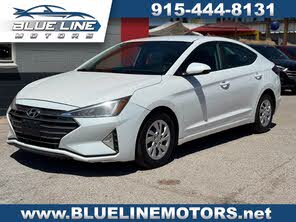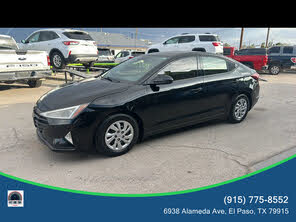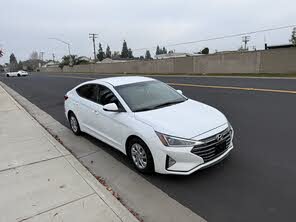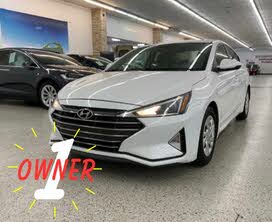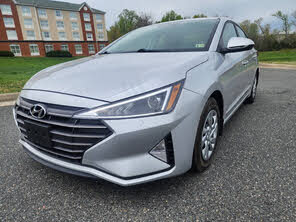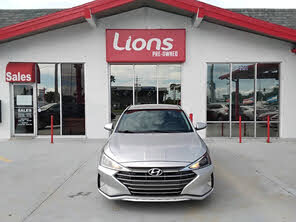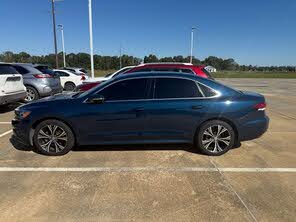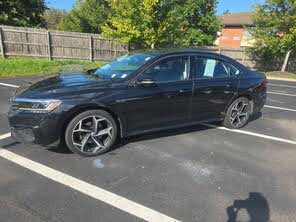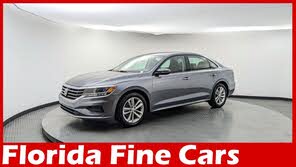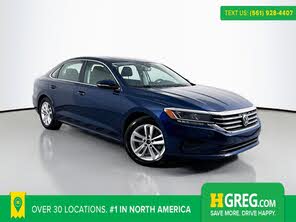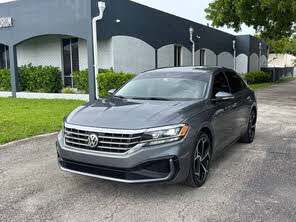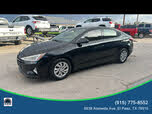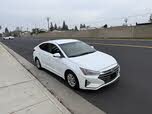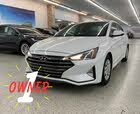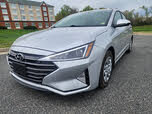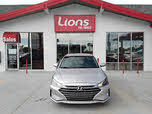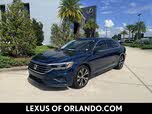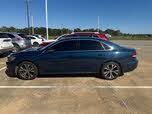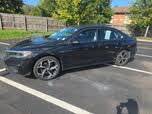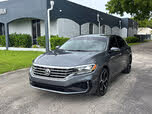2019 Hyundai Elantra vs 2020 Volkswagen Passat
Overview | |
MSRP$17,200 | MSRP$22,995 |
Listings756 | Listings264 |
Ratings & Reviews | |
User Reviews | User Reviews |
Expert reviews8.2 out of 10 | Expert reviews8.0 out of 10 |
Pros
Cons
| |
2019 Hyundai Elantra Reviews SummaryCustomer satisfaction is dependent on multiple factors. For example, let's say you go out to a new restaurant. Even if the service is great, or the bill is inexpensive, or the restaurant has a lovely ambiance, you probably won't go back if the food doesn't taste good. The updated and upgraded 2019 Hyundai Elantra is like that—unless you buy the turbocharged Sport trim. | |
2020 Volkswagen Passat Reviews SummaryVolkswagen builds a full-size car in Chattanooga, Tennessee, and has for nearly a decade. It’s called the Passat, and it gets a restyle for 2020. Huge inside like a full-size automobile, priced like a midsize sedan, and thrifty with gas like a compact car, the Passat has long been one of my favorite family haulers. Unfortunately, what it needs is a redesign, not a restyle. But since consumers want SUVs instead of sedans and VW is about to roll out a squadron of electric vehicles, the company couldn’t make a business case for spending a pile of cash to craft a new gas-powered car. Instead, you get the old one wearing a new suit. | |
Popular Features & Specs | |
Engine2.0L 147 hp I4 | Engine2.0L 174 hp I4 |
Drive TrainFWD | Drive TrainFWD |
Seating Capacity5 | Seating Capacity5 |
Horsepower147 hp @ 6200 rpm | Horsepower174 hp @ 5200 rpm |
MPG City26 | MPG City23 |
MPG Highway36 | MPG Highway34 |
Engine | |
Engine Name2.0L 147 hp I4 | Engine Name2.0L 174 hp I4 |
Torque132 lb-ft @ 4500 rpm | Torque206 lb-ft @ 1700 rpm |
Horsepower147 hp @ 6200 rpm | Horsepower174 hp @ 5200 rpm |
DrivetrainFWD | DrivetrainFWD |
Fuel Economy | |
MPG City26 | MPG City23 |
MPG Highway36 | MPG Highway34 |
Interior | |
Seating Capacity5 | Seating Capacity5 |
Safety | |
Front Crash Overall4 | Front Crash Overall4 |
Side Crash Overall4 | Side Crash Overall5 |
Dimensions & Capacity | |
Cargo Space14.4 cu ft | Cargo Space15.9 cu ft |
Curb Weight2972 lbs | Curb Weight3325 lbs |
Height56.5 in | Height58.0 in |
Length181.9 in | Length193.6 in |
Width70.9 in | Width72.2 in |
Wheelbase106.3 in | Wheelbase110.4 in |
Maximum Payload | Maximum Payload926 lbs |
Number of doors4 | Number of doors4 |
Overview | ||
MSRP | $17,200 | $22,995 |
Listings | ||
Ratings & Reviews | ||
User reviews | ||
Expert reviews | 8.2 out of 10Read full review | 8.0 out of 10Read full review |
Pros & cons | Pros
Cons
| |
Summary | Customer satisfaction is dependent on multiple factors. For example, let's say you go out to a new restaurant. Even if the service is great, or the bill is inexpensive, or the restaurant has a lovely ambiance, you probably won't go back if the food doesn't taste good. The updated and upgraded 2019 Hyundai Elantra is like that—unless you buy the turbocharged Sport trim. | Volkswagen builds a full-size car in Chattanooga, Tennessee, and has for nearly a decade. It’s called the Passat, and it gets a restyle for 2020. Huge inside like a full-size automobile, priced like a midsize sedan, and thrifty with gas like a compact car, the Passat has long been one of my favorite family haulers. Unfortunately, what it needs is a redesign, not a restyle. But since consumers want SUVs instead of sedans and VW is about to roll out a squadron of electric vehicles, the company couldn’t make a business case for spending a pile of cash to craft a new gas-powered car. Instead, you get the old one wearing a new suit. |
Video | ||
Popular Features & Specs | ||
Engine | 2.0L 147 hp I4 | 2.0L 174 hp I4 |
Drive Train | FWD | FWD |
Seating Capacity | 5 | 5 |
Horsepower | 147 hp @ 6200 rpm | 174 hp @ 5200 rpm |
MPG City | 26 | 23 |
MPG Highway | 36 | 34 |
Engine | ||
Engine Name | 2.0L 147 hp I4 | 2.0L 174 hp I4 |
Torque | 132 lb-ft @ 4500 rpm | 206 lb-ft @ 1700 rpm |
Horsepower | 147 hp @ 6200 rpm | 174 hp @ 5200 rpm |
Drivetrain | FWD | FWD |
Fuel Economy | ||
MPG City | 26 | 23 |
MPG Highway | 36 | 34 |
Interior | ||
Seating Capacity | 5 | 5 |
Safety | ||
Front Crash Overall | 4 | 4 |
Side Crash Overall | 4 | 5 |
Dimensions & Capacity | ||
Cargo Space | 14.4 cu ft | 15.9 cu ft |
Curb Weight | 2972 lbs | 3325 lbs |
Height | 56.5 in | 58.0 in |
Length | 181.9 in | 193.6 in |
Width | 70.9 in | 72.2 in |
Wheelbase | 106.3 in | 110.4 in |
Maximum Payload | 926 lbs | |
Number of doors | 4 | 4 |
The 2019 Hyundai Elantra underwent a significant redesign, featuring new styling elements forward of the windshield and front doors, along with redesigned wheels, a new trunk lid, taillights, and rear bumper. This kaleidoscopic design was a departure from its previous conservative look, which some found less appealing. Inside, the Elantra saw subtle improvements, such as new air vents, carbon-texture finishes on some plastic housings, updated gauges, and revised dashboard controls. These changes added excitement to the interior, which was otherwise high in quality, with a robust shifter and tightly assembled parts. The Elantra was available in various trims, with the Limited model offering a range of advanced features through the Ultimate Package, bringing the total cost to $26,690, including destination charges.
In contrast, the 2020 Volkswagen Passat retained a familiar exterior design, reminiscent of its predecessors and the VW Jetta. However, the interior saw a revamped dashboard, maintaining the architectural T-square design of the previous model. The Passat's interior was characterized by cheap, glossy plastic, but it was easy to clean and user-friendly. The car was available in four trims, with the R-Line model offering sporty looks and additional features, bringing the total cost to $30,206, including destination charges. Despite its simplicity, the Passat was easy to drive and offered a comfortable experience for both driver and passengers.


















The 2019 Hyundai Elantra was equipped with a 2.0-liter 4-cylinder engine producing 147 horsepower, paired with a 6-speed automatic transmission powering the front wheels. While it offered Normal, Sport, and Smart driving modes, the Elantra's performance was not particularly inspiring. The Sport mode added liveliness but also increased steering weight, leading most drivers to prefer the Normal mode. The Elantra achieved an EPA rating of 32 mpg in combined driving, with real-world testing showing a slightly lower 29.3 mpg. Handling was decent, though the ride quality was affected by the torsion-beam rear-axle suspension.
The 2020 Volkswagen Passat featured a turbocharged 2.0-liter 4-cylinder engine delivering 174 horsepower and 206 pound-feet of torque. It used a 6-speed automatic transmission, offering a Sport mode and paddle shifters for a more engaging drive. The Passat's engine provided sufficient torque for smooth acceleration, though the transmission occasionally upshifted early to maximize fuel economy. The car achieved 26 mpg on a testing loop, close to the EPA's 27-mpg rating. The Passat's steering was light yet precise, and its brakes were effective. However, the suspension tuning resulted in a stiff ride over sharp bumps and a floaty feel over undulations.
The 2019 Hyundai Elantra offered good front-seat comfort, with height-adjustable seats and available heated front seats. The backseat was less accommodating, with hard plastic front seatbacks and a lack of rear air vents and USB ports. Interior storage was decent, with a sizable center-console bin, glove box, and door panel bins. The Elantra's trunk provided 14.4 cubic feet of space, with a hands-free Smart Trunk feature for easy access.
The 2020 Volkswagen Passat was designed with American consumers in mind, offering a spacious interior with wide seats and ample room for five passengers. The Passat's trunk measured 15.9 cubic feet, with a flat load floor for maximum utility. The car's interior featured cloth upholstery in the base model, with leatherette and genuine leather available in higher trims. The Passat also offered rear air conditioning vents and heated seats for added comfort.
The 2019 Hyundai Elantra, excluding the base SE, came with a 7-inch touchscreen infotainment system featuring Apple CarPlay, Android Auto, and satellite radio. The Limited trim offered an Infinity premium sound system, with an 8-inch display and navigation available through the Ultimate Package. The Elantra's infotainment system was user-friendly, with a good balance of knobs and buttons. The car also provided a 3-year trial of Blue Link services for added convenience.
The 2020 Volkswagen Passat lacked the latest infotainment technology, featuring a 6.3-inch touchscreen display with App Connect, Apple CarPlay, Android Auto, and a CD player. The SEL trim included navigation and a Fender premium sound system. The Passat's infotainment system was simple and reminiscent of older designs, with physical buttons and knobs. The car also offered remote engine start and parking assist in higher trims.
The 2019 Hyundai Elantra included standard driver-assistance features such as forward-collision warning, automatic emergency braking, lane-departure warning, and blind-spot monitoring. The Limited trim added adaptive cruise control, pedestrian detection, and a Safe Exit system. The Elantra received top crash-test ratings from the IIHS, except for an Acceptable rating for LATCH anchor accessibility. The NHTSA awarded the Elantra a 4-star overall rating.
The 2020 Volkswagen Passat came with standard safety features, including forward-collision warning, pedestrian detection, automatic emergency braking, and blind-spot warning. The SE trim added adaptive cruise control and lane-keeping assist, while the SEL trim offered parking assist and adaptive headlights. The Passat received a top rating of Good from the IIHS in crash-test assessments.
CarGurus highlights

According to CarGurus experts, the overall rating for the 2019 Hyundai Elantra is 8.2 out of 10, while the 2020 Volkswagen Passat scores 8.0 out of 10. Based on these ratings, the 2019 Hyundai Elantra is the recommended choice, offering a better balance of safety, technology, and value.
Choose the 2019 Hyundai Elantra if:
- You prioritize advanced safety features and top crash-test ratings.
- You want a user-friendly infotainment system with a premium sound option.
- You seek a compact car with a competitive starting price and good fuel economy.
Choose the 2020 Volkswagen Passat if:
- You need a spacious interior with ample trunk space for family use.
- You prefer a simple, straightforward infotainment system with essential features.
- You value a comfortable ride with light and precise steering.
CarGurus highlights

According to CarGurus experts, the overall rating for the 2019 Hyundai Elantra is 8.2 out of 10, while the 2020 Volkswagen Passat scores 8.0 out of 10. Based on these ratings, the 2019 Hyundai Elantra is the recommended choice, offering a better balance of safety, technology, and value.
Choose the 2019 Hyundai Elantra if:
Shop Now- You prioritize advanced safety features and top crash-test ratings.
- You want a user-friendly infotainment system with a premium sound option.
- You seek a compact car with a competitive starting price and good fuel economy.
Choose the 2020 Volkswagen Passat if:
Shop Now- You need a spacious interior with ample trunk space for family use.
- You prefer a simple, straightforward infotainment system with essential features.
- You value a comfortable ride with light and precise steering.

By: CarGurus + AI
At CarGurus, our team of experienced automotive writers remain at the heart of our content operation, conducting hands-on car tests and writing insightful guides that are backed by years of industry experience. To complement this, we are harnessing AI to make our content offering more diverse and more helpful to shoppers than ever. To achieve this, our AI systems are based exclusively on CarGurus content, ratings and data, so that what we produce is both unique to CarGurus, and uniquely helpful to car shoppers.


